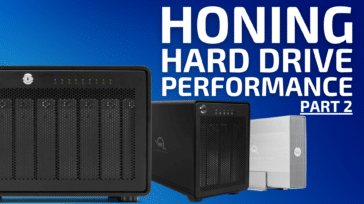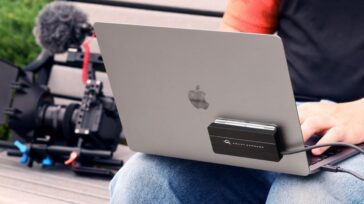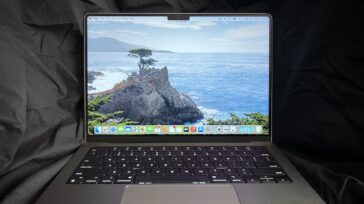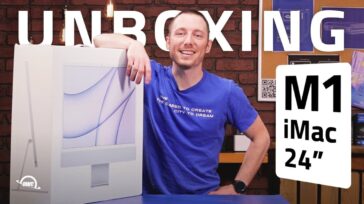 Since our original SSD Shootout back in February, we evaluated our tests and decided to update them. While we still found that the OWC Mercury Extreme Pro SSD significantly reduces the boot time and application launch times of the computers in which they are installed, the extent that they do is quite impressive.
Since our original SSD Shootout back in February, we evaluated our tests and decided to update them. While we still found that the OWC Mercury Extreme Pro SSD significantly reduces the boot time and application launch times of the computers in which they are installed, the extent that they do is quite impressive.
In these new tests, we time how long it takes to boot Mac OS X 10.6.3 and launch the four major components of Adobe Creative Suite CS5: Photoshop, Illustrator, Dreamweaver and InDesign. This is a straight speed test – the first one finished wins.
In the “second” iteration of this test, we put an OWC SSD in a 13” MacBook Pro, left a nearly identical (though slightly faster processor) model in its stock configuration and let them duke it out. The difference was quite impressive; the OWC SSD-equipped machine trounced its higher-powered twin.
The difference was so impressive, in fact, that we began to wonder how much of a processor speed gap an OWC SSD could overcome. To test this, we took a stock i7 MacBook Pro, and put it up against previous iterations, going all the way back to the original Core Duo MacBook Pro from 2006. As impressive as the results were for the “second” test, this “third” test is even more eye-opening.
For your convenience, we’ve included the videos after the break.







Caution – If the hype on the internal hard drives (SSD) is as far off base as the hype for the portable hard drives (SSD) was you will be very upset with your choice. When you say this is not a satisfactory device OWC will run its standard tests, declare it good and ignore your request to return the device.
My portable SSD is slower in actual use than a usb portable hard drive. (compared to OWC units only),a request to return the unit was denied because the unit met the “std test”
DO your home work, these items are expensive and not ready for prime time
Hi Bill:
Sorry to hear of your – what I must call – isolated experience. Very seriously and honestly, I have not heard of one similar slow performance example from either users or the media…the latter with which I work very closely. Of course, unfortunately, that doesn’t change the status of your experience. As you can see, we made your post live so all issues are transparent. After a brief investigation into your circumstances, we need to take this under higher examination here and someone will be contacting you directly to discuss the matter and try and bring it to a successful resolution for you.
This is a shame for sure. I much more enjoy social media comments from users about our SSDs like:
“Used my new OWC 480GB SSD extensively w/ Aperture 3 & 5D Mark II RAW images, Processed & edited 1000s & performance is stunning.”
“Wanna make your MacBook Pro waaay faster? Get an SSD like I did. Incredible speed when ingesting #DSLR footage.”
I’m hoping after some additional investigation we can add sentiments like above from you too!
Have faith and patience…we’re here for your satisfaction.
I forgot to add that my computer runs cooler. I depend on this computer for my business and it runs at least 12 hours per day. I back up to a Time Machine volume, but I am must less worried about my hard drive going south given the excellent error correction, over provisioning, and resistance to G forces. Oh, and the battery lasts longer too.
Good to hear Paul…running cooler around electronics always a good thing!
I’ve had an OWC Mercury Extreme SSD OWCSSDMXE200 since 3/27/10. I have a 2.2 GHz MacBookPro3,1 from December 2007. I use it with 500 to 1200 page Adobe Acrobat Professional files. It is not only the boot time that is outstanding. I am able to scroll huge Acrobat files without most of the “stuttering” that took place before the upgrade. It actually makes my computer useful. When I run disk utility to repair permissions or verify my drive it seems to be an order of magnitude faster than before. Launching MS Word or Excel is much faster. Also running iDefrag is really amazingly fast, even though I probably don’t need to run it.
Can you address OS X’s lack of trim support? How will this affect the SSD performance as it gets used more & more?
At this time OS X does not support TRIM, however with the OWC Mercury Extreme Pro and Pro RE series of drives, the 7% or 28% overprovisioning (respectively) virtually eliminates any need for TRIM.
Mac Performance Guide shows this best in their Real World SSD performance tests where heavy usage over time is quantified:
http://macperformanceguide.com/SSD-RealWorld.html
OK, now how about you show us some tests that don’t include booting.
I know the amount of RAM affects the boot time, so the older machines with less RAM had an advantage there.
Hi Bill and thanks for stopping by. We wanted to “de-tech” SSDs a bit with our tests and show how every user could benefit by adding these to their Mac or PC.
As many of the high end benchmarking sites go deep with their tests, there wasn’t more we could add to their already extensive list…check out this recent on examining an OCZ drive…even though not our review per se, our drive still comes out on top…
http://www.storagereview.com/ocz_vertex_2_review_120gb
and for others, just click on any of the reviews links at the bottom of this page:
http://eshop.macsales.com/shop/internal_storage/Mercury_Extreme_SSD_Sandforce
Now all that said, we’re looking at replicating Macperformanceguide.com’s speed degradation test…but this time including the current darling of the drive industry…the hybrid…to show that the honeymoon with it ends far too quickly.
I think Grant gave a good explanation of different tests available, so I’m not going to go into that too much.
However, I would like to address the claim that the older machines had an advantage in memory.
Even IF there’s an “advantage” in having less RAM during a boot test in that there’s less memory to check at startup, this advantage is cancelled out by other factors such as a slower processor, a slower system bus and the fact there’s less memory to use during startup; the older machines would have been at a disadvantage. Yet, due to the speed of the OWC SSD, they still wound up booting faster.
If you really want to remove RAM, bus speed, etc. from the equation take a look again at Shootout #2 – same model, same RAM amount, same OS, same bus speed. The only difference was the drive used – The OWC SSD was radically faster.